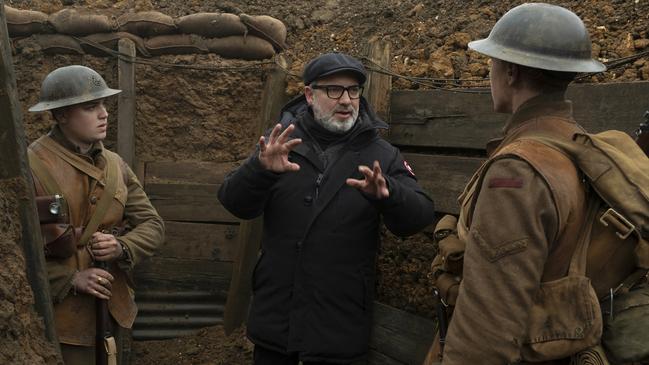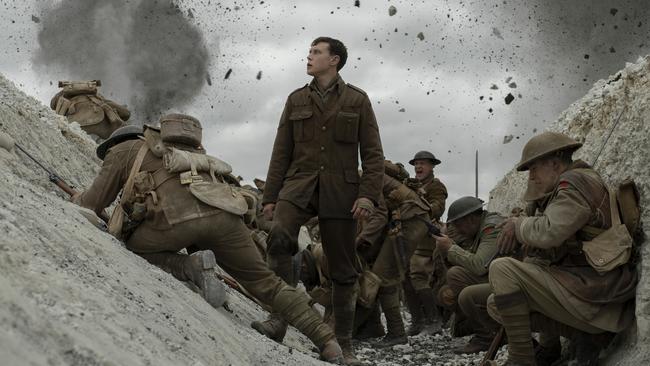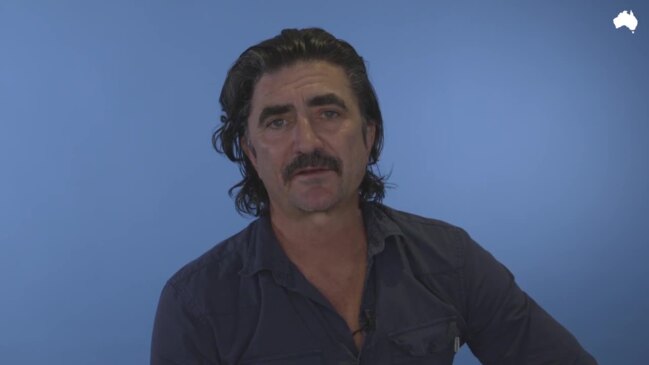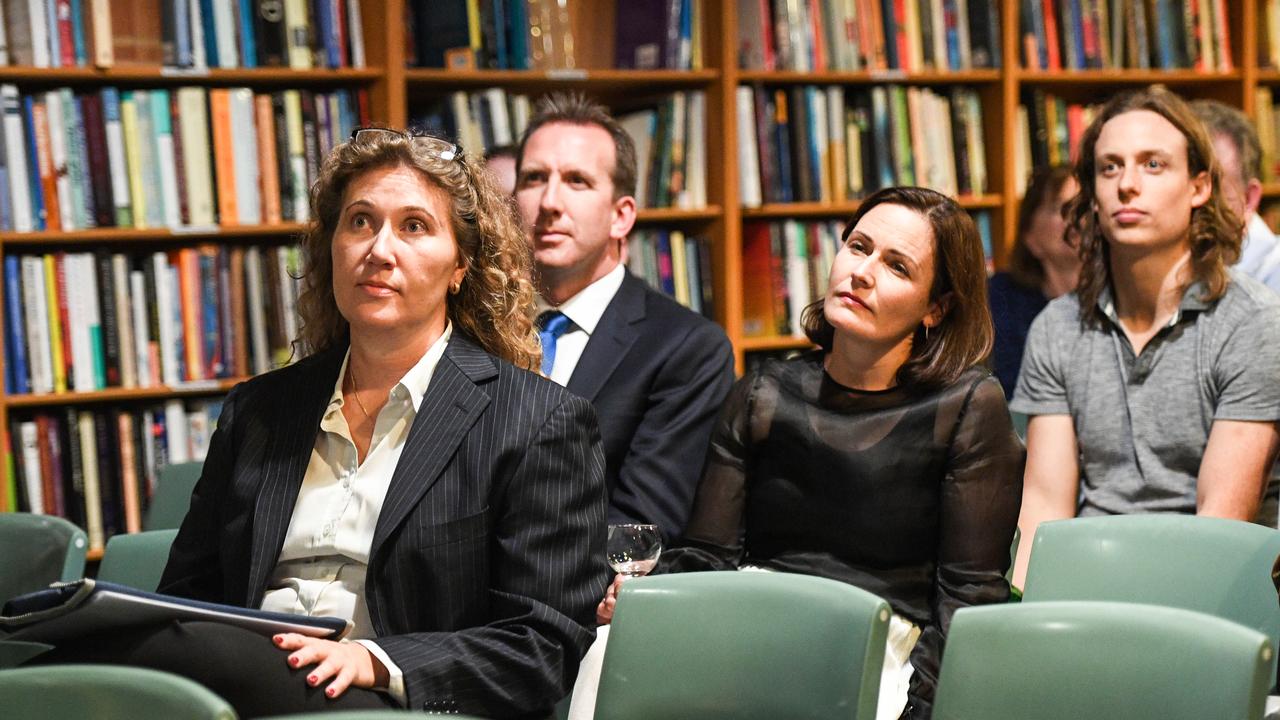Oscars 2020: Audiences should know Australians were there too in 1917
Sam Mendes’s breathtaking film is a stunning work of art, but it tells only part of the story.

Sam Mendes’s film 1917 is expected to do well at the Academy Awards on Monday (AEDT). Its outstanding depiction of the Western Front has been acclaimed. The filmmakers’ pursuit of authenticity, “getting it right”, was painstaking.
“You are not making a documentary,” Mendes said, “but you do want it to feel, in every possible detail, historically accurate.” His film brilliantly evokes what it was like to be at the Western Front when the Germans completed their withdrawal to the Hindenburg Line in March 1917.
According to Mendes, who directed and co-wrote the screenplay, the idea came from memories of his grandfather, who served in the British Army and was awarded the Military Medal for exceptional bravery as an intrepid messenger at Passchendaele in October 1917. Mendes wanted to expand part of a story he had heard from his grandfather into a film. He evidently concluded it would be preferable to set it in the phase earlier that year when the Germans retreated. (Some critics have expressed misgivings about this, claiming that a few implausibilities have blemished the plot.)
As a result, the dramatic essence of 1917 has a good deal in common with Peter Weir’s Gallipoli. Both films depict the desperate efforts made by a low-ranked soldier or two to convey a direction to a commander about to launch an ill-advised attack that the assault should be cancelled. In each film a messenger’s closeness to an individual about to go over the top increases the tension.
This is not the only Australian link to 1917. The context of the film involves close Australian Imperial Force connections. To highlight them is not tantamount to claiming they should have been incorporated in the film; rather, it’s to heighten awareness of these associations as filmgoers appreciate Mendes’s epic.
In the film, the British operation that Mendes’s main characters, a pair of lance corporals, are trying to stop is about to be undertaken by the 2nd Devonshire Regiment near the town of Ecoust in April 1917. The commander of the Devonshires, played by Benedict Cumberbatch, believes the Germans are on the run and now is the time to attack them, whereas his superiors are concerned that he is about to be lured into a trap.

In fact, the 8th and 9th Devonshires did attack at Ecoust early that month as part of a co-ordinated assault with Australian battalions. The AIF had been involved in the area south and east of Ecoust for weeks. They had been grappling with the dilemma underlined in 1917: did the German withdrawal create a rare opportunity for a decisive attack or should they be wary of playing into the Germans’ hands?
Once it was confirmed that the Germans had departed, two advanced guards were formed in the AIF’s sector to harass the retirement. Both the commanders chosen, generals “Pompey” Elliott and John Gellibrand, were capable and vigorous. But they were told to proceed with caution. They would be operating on a tight rein. It wasn’t easy to adjust to the different conditions after the appalling 1916-17 winter in the Somme trenches, but Elliott’s formation began well. The envelopment tactics he favoured suited these pursuit operations, and his men captured several villages in quick succession: “My methods of attack … were simply paralysing the old Bosche,” he declared. Pompey wanted to keep advancing but was overruled. He was furious.
Forthright and volatile, he was adamant that his cautious superiors were wasting valuable opportunities: “For three whole days we were absolutely forbidden to advance one step further,” he wrote. “I had to watch the Bosche digging trenches like fury night and day where he had none at all in front of me, and I could do nothing but fret and fume and swear.”
His frustration influenced his reaction when counterattacking Germans temporarily recaptured a town that his formation had taken. Pompey’s instinctive response was to hit back and he began planning an attack on other towns farther away. But commanders above him disapproved and he was overruled again.

Pompey stayed convinced that an “extraordinarily favourable” opportunity derived from the “wonderful tactical advantage” his formation had gained had been “frittered away” because his superiors were “so blessed windy”.
Gellibrand’s advanced guard was closer to Ecoust. It advanced on Elliott’s left with Ecoust on its left front. Progress was pleasing, and patrols from Gellibrand’s formation were soon scrutinising the outskirts of Ecoust.
Just 2km southeast of Ecoust was the town of Noreuil. Inconsistent directions from Gellibrand’s superiors gave him the feeling he had been let off the leash and aggressive action would be welcomed. So he arranged a rash night attack at short notice on March 20 to capture Noreuil. However, as his biographer Peter Sadler noted, frontline German commanders were instructed to take “immediate advantage of enemy indiscretions” and they did. The venture was a failure. About 270 Australian casualties resulted.
Tiredness had contributed to this reverse, and Gellibrand’s men were relieved. Fresh replacements proceeded to tackle Noreuil with other outpost towns in front of the Hindenburg Line in the AIF sector. These operations benefited from more orthodox planning.
The 13th AIF Brigade, led by General William Glasgow, attacked Noreuil successfully as part of the co-ordinated advances that included the Devonshires’ attack at Ecoust. Charles Bean noted in his Official History of Australia in the War of 1914-1918 that the Devonshires “suffered many casualties” at the Ecoust cemetery but eventually they also prevailed and the town was captured.
These operations paved the way for a full-scale onslaught against the Hindenburg Line. The Battle of Bullecourt began soon after. It proved a disaster for the AIF, but that’s another story.
A year later the 2nd Devonshires were at the tactically vital town of Villers-Bretonneux when Glasgow’s brigade and Elliott’s brigade carried out the acclaimed counter-attack that recaptured it and retrieved the situation in front of Amiens. Soon afterwards Glasgow and Gellibrand were promoted to divisional command, but Elliott was overlooked. Pompey remained profoundly aggrieved for the rest of his life.
As for Gellibrand, his postwar reflections about the conflict inevitably included Noreuil. It was one of the two “really awkward spots in my AIF life”, he admitted. The mixed messages he received from above had been influential, but he conceded that he had been “too emphatic in stressing the necessity to press forward on a retreating enemy”. Bean felt Gellibrand’s superiors had been “half inclined to press on … and half inclined to hold back”. The same perplexity and lack of consensus about the optimal approach is at the heart of Mendes’s fine film.
Ross McMullin’s most recent book is Pompey Elliott at War: In His Own Words.



